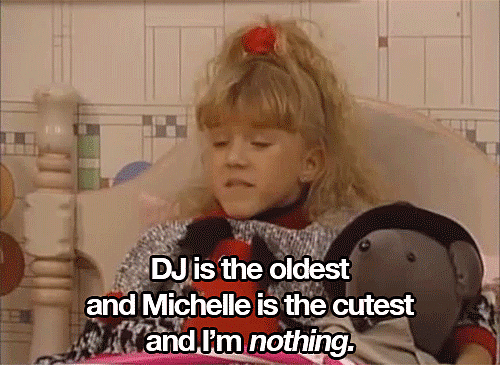9 Scientific Facts That Make You Wish You Were The Middle Child
It must be true if science backs it up!
For decades, it's a known fact that middle children - those born in between the eldest and the youngest - tend to have a hard time growing up
Within their families, they're sometimes misunderstood, neglected and underestimated
Although middle child syndrome sounds bad, some researchers suggest that being a middle child actually has some surprising advantages, like...
1. They're emotionally strong and less prone to be diagnosed with disorders like ADHD. Nothing they can't handle!
According to a 2013 study, researchers at Universidad Autónoma de Madrid found that middle children who lived with both biological parents were less likely to develop emotional disorders or be diagnosed with ADHD than their siblings.
Why? They're constantly surrounded by family and siblings. The doctors determined that's a surefire way for them to stay healthy.
2. Middles are risk-takers, often going against the grain to achieve what they want. Okay, maybe they're just rebellious.
Katrin Schumann, author of The Secret Power of Middle Children believes that middles don’t get enough credit for their innovative thinking. "Because parental expectations haven’t been as onerous for middles as it is for firsts and even last-borns, there’s a little more freedom and flexibility as they’re growing up to see the world through their own lenses instead of something that’s been imposed on them by others’ expectations," she says.
So middles are often trailblazers, because they have that freedom to think outside the box. Especially in the workforce today, where we’re required to have a lot of individual energy and personal drive as opposed to just sitting at a desk following rules, that kind of ability to think outside the box stands you in good stead
3. Diplomatic and self-aware, middles are good team players. They make very good listeners too!
Middles are self-aware team players with remarkable diplomatic skills. Because they’re both outgoing and flexible, they tend to deal well with others—in the workplace and at home. They’re more motivated by fairness than money when making life choices, and have a deep sense of family, friends, and loyalty, as stated by Katrin Schumann, in her book The Secret Power of Middle Children.
4. When they're surrounded by older and younger siblings, middles have to constantly compete for attention and resources - which makes them good negotiators and peacemakers
Just adds to the politician career path here, doesn't it? Drs. Jason Kaufman and Daniel Eckstein looked into famed psychotherapist Alfred Adler's individual psychology theory and researched how birth order affects personality.
In their 2012 studies, they found that since middle siblings may have to negotiate between the oldest and youngest children, and always have to be articulate in order to be heard, they're excellent at eloquently presenting their points.
5. Highly devoted and faithful, middles are marriage material. Ahem, ahem...
The conflict-resolution skills that middle children learn aren't just helpful in the workplace — they're also keys to a long-lasting marriage. A study by the University of Washington's John Gottman found that couples who were willing to make compromises and were able to clearly state their positions during arguments had stronger marriages than couples who weren't.
In a survey, 80% of the middle children had never cheated on their significant others, while 65% of firstborns and 53% of lastborns had.
6. Firstborns have always been labelled as the smartest in the family, but a research published earlier this year found that firstborns' IQs are only one point higher — a fairly negligible difference!
While researchers found that first-born children have a single-point advantage when it comes to IQ along with some measured personality differences from those who are born later. First-borns were more "extroverted, agreeable and conscientious" overall, according to the study, which was published in the Journal of Research in Personality.
But the correlation on those personality differences is so tiny that it really doesn't speak to any noticeable effect between individuals born first and those born later.
7. Because they have an older and younger sibling, middles essentially get to experience the best of both worlds
Children who grow up with one or more siblings get along better with their classmates in kindergarten than others who are the only child, new research shows. In a national study of more than 20,000 children, teachers rated students who had at least one sibling as better able to form and maintain friendships, get along with people who are different, comfort and help other children, express feelings in a positive way, and show sensitivity to the feelings of others.
osu.eduThis means middle children experience the best of both worlds: They learn from the wisdom of elders, while still acting as leaders to their younger siblings. But unlike their siblings, who are often pigeonholed into their family roles, middle children have the fluidity to serve as both mentors to their younger siblings and mentees for their older ones.
8. Middle children are more likely than their siblings to be successful and enjoy strong social lives and flourishing careers (especially in business and politics) - history has proven it
Psychologist Catherine Salmon and journalist Katrin Schumann, point out that middle children are more likely to become leaders in business and politics. Schumann says getting less attention from parents makes middle children more creative: "There are some hidden benefits to not focusing so much attention and concern and effort, and putting so much pressure on each child.
And that is one of the hidden benefits that middle children get because they do have this sense of independence and they think outside the box a little bit more."
One of the most successful entrepreneurs of modern times, the Microsoft genius Bill Gates, is also a middle. His remarkable ability to think outside the box and take moderate risks are attributes often found in middle-borns.
And consider this: of all the U.S. Presidents since 1787, no fewer than 52 per cent were middle children.
9. Middles are less susceptible to 'helicopter parenting' - a style of parenting overfocused on their children. In other words, middles are independent lah. :D
The fact that middle children tend to be "forgotten" suddenly doesn't sound like such a bad thing. While other kids suffer from the effects of overparenting, middleborns are largely left to their own devices, which means they have the freedom to solve their own problems and forge a path for themselves in the world — without unnecessary parental intervention.
It seems a bit counterintuitive, but in a post-helicopter age where many college kids and beyond aren't very good at managing their own time and efforts, perhaps because parents have done too much of this for them, it seems like there might be a real advantage to not be the 24/7 focus for parents.











